Smart EV Charging: The First Step Towards Robust EV Charging Infrastructure
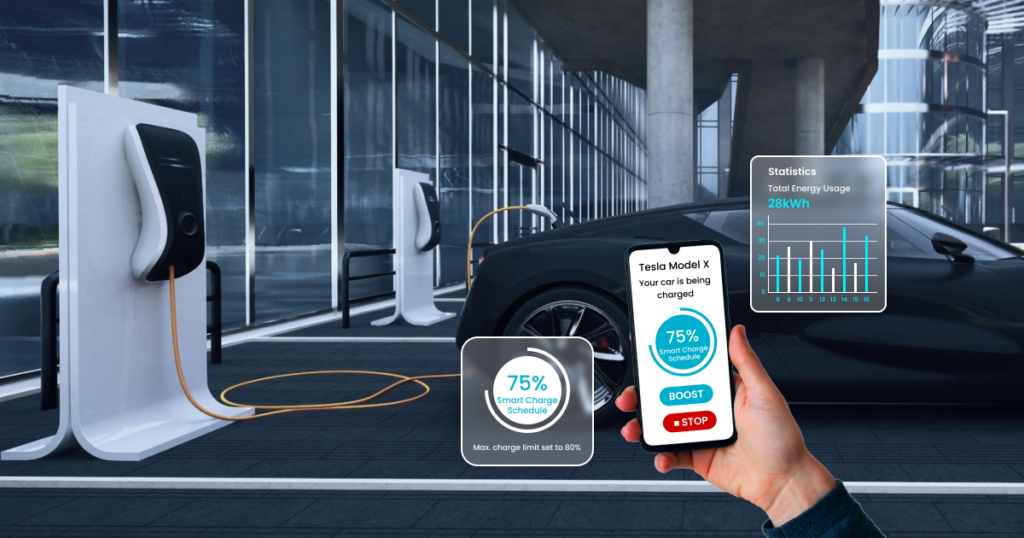
As e-mobility becomes mainstream and global EV sales soar, drivers want robust, reliable, and efficient EV charging infrastructure. The growing need for resilient EV charging infrastructure has led to innovations in charging technology.
Smart EV charging is an innovative approach to deliver an enhanced user experience by giving drivers and charging station operators better control of the charging process. This blog post will explore the revolutionary smart charging technology for electric vehicles:
Growing EVs and the Importance of Smart Charging
According to a report published by Counterpoint Research, around 17 million EVs will be sold by the end of 2023. And this figure will continue to surge in the coming years. Every big player – from Toyota to BMW – in the automobile industry is introducing advanced EV models.
With EV adoption quickly keeping up the pace, creating a powerful network of EV charging stations becomes indispensable.
How Robust is Present-day EV Charging Infrastructure?
According to the U.S Alternative Fuels Data Center, there are around 52000 public charging stations in the United States.
This figure may seem impressive, but it’s not enough, given the escalating number of EVs on the road. According to a report by Mckinsey, the U.S. would need almost 20X more charging stations to address the increasing number of EVs.
Limited charging infrastructure is one of the reasons that discourage potential buyers from switching to EVs. Setting up smart EV charging stations is an effective way to address this problem. Let us see what is smart charging and how it works.
Smart EV Charging Station – Intelligent Way to Power up Your Electric Vehicles
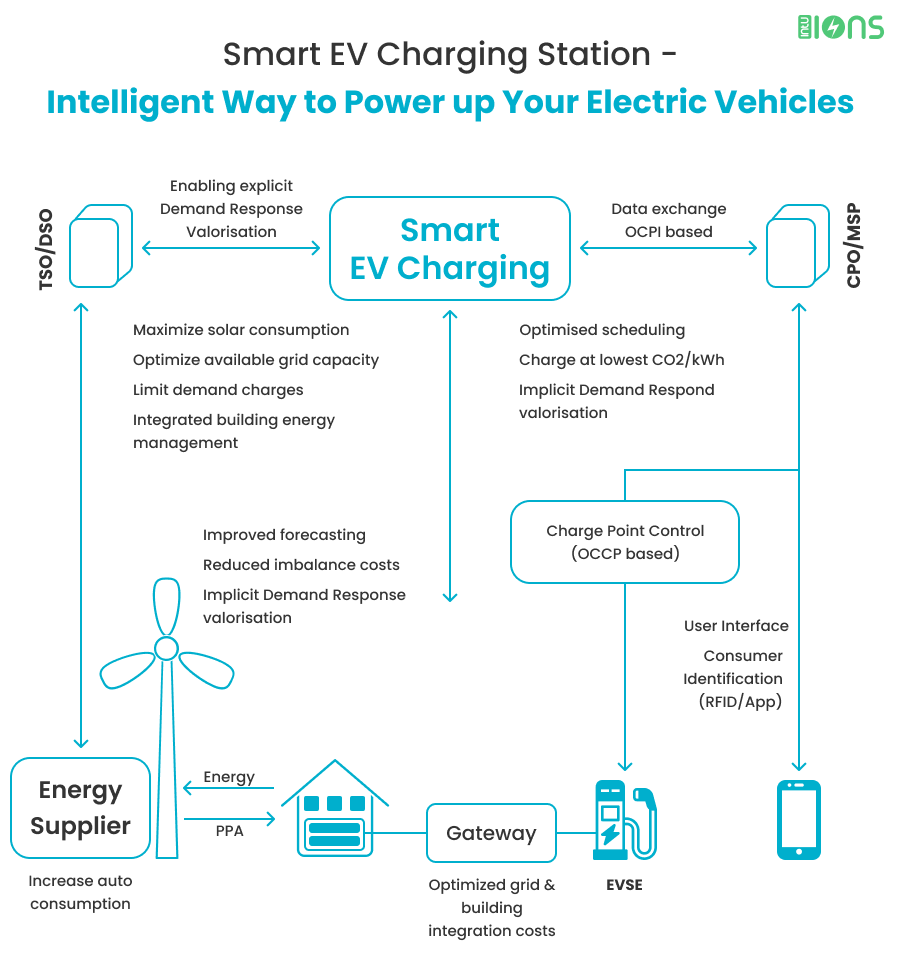
Smart charging is an umbrella term that combines multiple emerging intelligent technologies to make EV charging efficient, optimized, and cost-effective. It is an advanced system that connects multiple devices – EVs, chargers, charging points, and grids – to a cloud-based platform to transfer real-time data. With this data, the users can remotely monitor, manage and adjust different aspects of energy consumption.
Difference Between Smart EV Charging and Traditional (Dumb) Charging
For a better perspective of smart EV charging, it is important to understand what is traditional or dumb charging.
Here is a small comprehensive comparison between fast and intelligent electric vehicle charging, based on some of the main parameters:
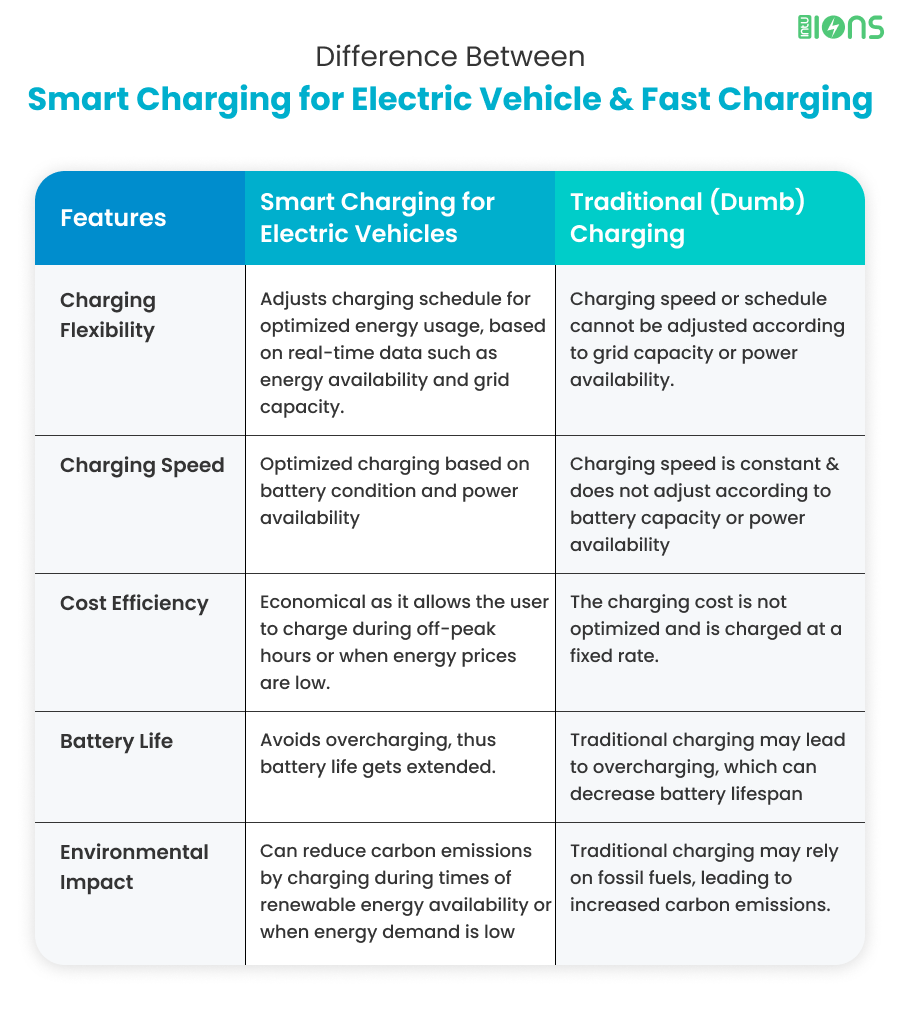
How Does Smart Charging for Electric Vehicles Work?
Smart charging refers to an intelligently connected network of EVs, charging stations, and utility companies.
With advanced cloud-based EV charging software, smart charging enables seamless communication and power management with all interconnected devices.
The EV charging station gathers real-time data such as charging speed and time, local electricity consumption, along with grid capacity.
This massive data is then transferred to a cloud-based platform where it is analyzed for actionable insights about power consumption, helping you to regulate and optimize energy usage.
What is Smart Energy Management for EV Charging?
Creating a sustainable energy system is critical to ensure carbon neutrality. This can be achieved with smart energy management technology.
As the number of EV sales rises, the electric grid experiences a load surge, resulting in an inefficient EV charging infrastructure.
Smart energy management practically addresses this challenge as it optimizes power utilization and acts as a load balancer.
How Smart Energy Management Benefits EV Charging?
Smart energy management applies a suite of technologies and AI to streamline the process of energy usage and supply to EV charging stations.
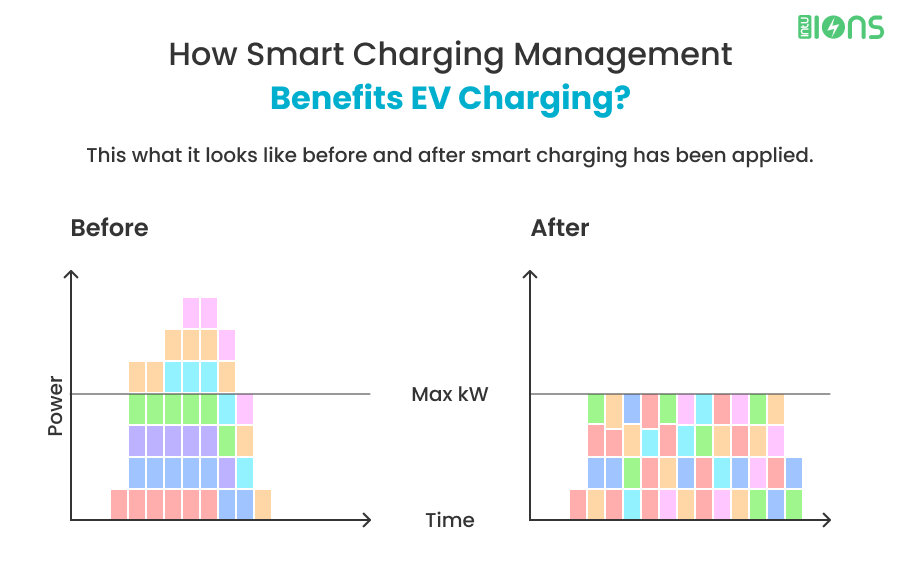
What’s more, smart energy management distributes the charging loads across different sources to safely supply electricity to residential and public charging stations.
With a smart energy management system, EV charging stations can monitor power usage and ensure the right amount is delivered to consumers at a reasonable cost.
Moreover, smart energy management balances the demand for electricity throughout the day.
Based on the fluctuations in the demand for energy, this system reduces the power supply directed to EV charging stations during peak hours.
Which Technology Enables Efficient Smart EV Charging?
- OCPP protocol in smart charging
OCPP or The Open Charge Point Protocol enables streamlined communication between EV charging stations and smart energy management systems.
Moreover, the OCPP protocol enables the user to regulate the charging speed remotely, monitor the charging status and ensure an effective billing cycle.
Further, in smart charging, OCPP analyzes factors such as the availability of renewable sources and grid demand to optimize EV charging.
- ISO 15118 for Encrypted Data Transfer
ISO 15118 is an international standard that synchronizes the communication channel between EVs and chargers for secure identification, authentication, and payment process.
Moreover, this standard allows EV charging stations to monitor and adjust the charging process from a remote location.
Transform the Way you Charge Electric Vehicles – Smart EV Charging Benefits
Here is how smart charging for electric vehicles benefits EV drivers, businesses, and EV charging networks:
Smart EV Charging Benefits for EV Owners
- Extends the Battery Life
Like everything else, car batteries too have an expiry date. However, keeping the battery attached to the charger even when it is 100% can shorten its lifespan.
With smart charging, you don’t have to worry about unplugging your vehicle when the batteries are fully charged. Smart charging handles that for you! Smart charging systems monitor the battery level – if it is completely powered up, it will adjust the charging rates and even stop the electricity supply if the battery is 100% charged up.
This prevents the battery from getting overcharged or undercharged, thus extending its lifespan.
- Locate Nearby Charging Stations Via Mobile Apps
With limited EV charging infrastructure, locating EV stations can be difficult. But, smart charging enables the drivers to find available charging points via a mobile app and even reserve a charging spot.
The mobile apps display crucial information about the charging speed, availability of charging spots, and prices. Based on the data, users can schedule the charging when the prices are low or renewable power sources are available.
- Lowers Range Anxiety
Range anxiety is a significant reason why many users still hesitate to buy EVs. With smart charging, EV drivers can access real-time information about charging status and the approximate power surplus. This helps solve range anxiety issues, along with improving the overall driving experience.
- Transparent Billing Cycle
As opposed to traditional charging, smart charging automates billing. Automated billing is done based on information such as customer identification and authentication. The charging begins only when the drivers have identified themselves at the station with either the mobile app or an RFID tag.
- Economical and Environment-Friendly
With smart charging, the users can schedule their charging event when the electricity consumption is lowest. This not only helps them save a huge amount but also stabilizes the grid as it doesn’t get overwhelmed due to heavy usage.
Smart EV Charging Benefits to Businesses
- Opens an Avenue for Additional Revenue
Setting up smart EV charging at commercial spaces that experience a high volume of traffic like shopping malls or hotel parking lots can open an additional avenue to generate more revenue.
Regular visitors to your business premise will prefer to plug in their EVs for charging while they can go on with their routines. With a proper pricing model, businesses make some extra money by charging a fee whenever a driver plugs in their vehicle to charge the exhausted batteries.
- Remote Monitoring and Energy Management
Traditional charging doesn’t give businesses any control over the charging events. This can put an extra load on the local grid or can cost you a fortune in form of an electricity bill.
Smart charging connects all the stations allowing businesses to monitor energy consumption and even adjust it according to peak demand. With this, you can save money without overburdening local grid capacity.
Moreover, it gives quick access to vital data such as total usage and even triggers a notification in case of a technical issue.
- Hassle-Free Billing
Having a convenient and transparent billing system that charges customers directly from credit cards is the first step to making EV charging infrastructure robust.
Payments and billing become more streamlined as the drivers are sent automated bills at the end of each billing cycle. The users can make digital payments to the business accounts directly via credit cards.
Smart EV Charging Benefits for Utility And Energy Companies
- Optimize Use of Renewable Sources of Energy
While fossil fuel power plants can adjust electricity generation based on the demand-supply curve, the same is not possible with renewable sources such as the sun or wind.
You cannot dim the sun or make the wind blow at less speed. Now, with more and more grids powered by renewable sources, it is important for electricity demand to follow supply.
Since a smart EV charger adjusts the charging speed and time, it can minimize the demand on the grid when renewable power generation is at its lowest.
- Stabilizes Grid During Peak Hours
Smart charging allows monitor and regulate the power supply. EV network owners can automate the charging process during low consumption and demand. This can help in making the electric grid stable and doesn’t put any extra strain on them during peak hours.
Moreover, with rapid EV adoption, the demand-supply gap will widen in the future. Smart EV charging provides flexibility to energy companies to narrow down the demand-supply curve without destabilizing the grid.
- Optimized Revenues
Smart charging systems offer in-depth insights into energy consumption and demand. Depending on this, the energy companies can decide the pricing models and tariffs. Such dynamic pricing helps energy companies to generate more revenues while delivering an unparalleled user experience.
- Make EV Charging Infrastructure More Efficient
Smart charging system gathers and analyzes data about charging activities and provides tons of actionable insights. With these insights, energy companies can detect possible issues to ensure more efficient charging infrastructure and streamline their operations.
Smart EV Charging Benefits for EV Fleets
- Lowered Operating Costs
Exorbitant operating costs is one of the issues faced by fleet managers. With an intelligent charging system, fleet managers can schedule the charging activity on days when the electricity prices dip significantly. Moreover, EV fleet management software offers real-time data about battery power and electricity prices allowing better utilization of the fleets.
- Offers an Economical Option
Charging a large fleet of EVs can cost a fortune for companies. Smart charging systems allow fleet managers to determine the best time for charging EVs at an economical price. They can schedule the charging when the electricity demand and prices are low.
- Better Fleet Management
Smart energy management equips the fleet managers can real-time data about the charging activity of the fleet. This data helps fleet managers to monitor electricity consumption and identify the most effective and economically beneficial opportunities.
- Regulate Charging Process Remotely
Managing an entire EV and its charging is daunting. Monitoring and controlling the charging activity of each vehicle not only makes them vulnerable to errors but can also be time-consuming. Smart EV charging allows fleet managers to remotely manage and monitor the charging activities.
What is Smart EV Charger and How Does it Work?
A smart EV charger is a combination of advanced hardware and software that enables automated control EV charging process. It gathers and analyzes the electric signals from different devices to manage and control the energy supply.
These intelligent EV chargers allow users to power up their cars and don’t require constant manual intervention.
A smart EV charger consists of:
Charging unit – These units combine advanced hardware and software that supports smart EV charging and are generally attached to the cable.
- Charging unit – A box that houses the intelligent hardware and software required for smart EV charging. It is generally attached to a charging cable.
- Wifi or Bluetooth connectivity – Charging data is transferred via wifi or Bluetooth connection.
- Smartphone app – EV smart chargers are connected to a mobile app that enables the charger to communicate with the EVs.
Smart EV chargers transmit real-time data with interconnected devices and enable automation charging process. The charging is done based on the preferred and preset configurations.
What are the Features of Smart Charging for Electric Vehicle?
Here are some of the features that make smart EV charging a popular choice for a robust EV charging infrastructure:
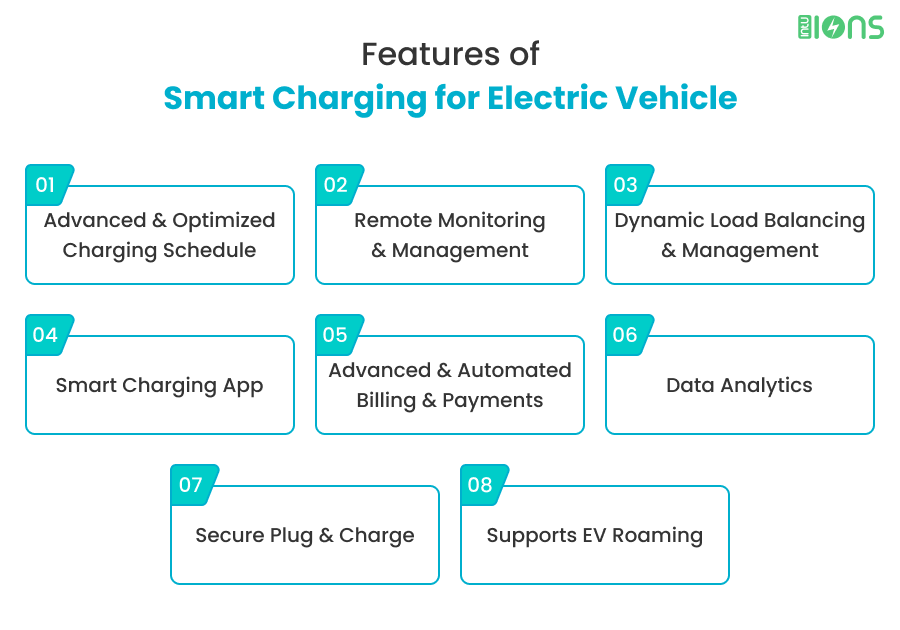
- Advanced and Optimized Charging Schedule
Charging an EV when the electricity charges are high or the demand is too heavy will not only put pressure on the grid, but the electricity bills will cost the drivers a fortune.
Smart EV charging helps users to access critical data such as low-cost and demand hours. With this information, EV drivers can determine the best time to optimally charge their vehicles without breaking the bank.
- Dynamic Load Balancing and Management
Dynamic load balancing and management ensure the charging activities are aligned with the demand-supply charge, grid capacity, and price.
Smart charging solution for electric vehicles pauses the charging activities during high peak hours to stabilize the grid. This is known as peak shaving and also helps EV drivers to save a huge on monthly electricity bills.
Besides, smart EV charging enables remote regulation of the power output. This is done based on real-time data such as power availability and fluctuation in demand. You can read more about EV charging load management and balancing here.
- Remote Monitoring and Management
Whether it’s an EV driver or charging station operator needs to have the ability to supervise the charging process from a remote location for better control.
A cloud-based smart monitoring system allows charging station operators to access crucial data to keep an eye on any potential problem. Remote monitoring enables them to identify the problem and perform quick troubleshooting, so they are no shutdowns.
- Data Analytics
What differentiates smart EV charging from traditional one is its ability to collect, store and analyze pivotal data about charging activity.
Smart charging systems with advanced algorithms can identify the patterns to predict when and how to optimally charge an EV. This enhances the effectiveness of the charging process and EV charging infrastructure.
- Smart Charging App
EV charging app has become important to deliver an unmatched user experience.
Smart charging app makes it app to select a preferred payment method or search for available chargers.
Apart from this, charging apps allow the user to set the configuration and parameters to make the EV charging process more sustainable.
What’s more smart charging apps bring current and historical data on a centralized platform. This allows the user to analyze energy consumption and its cost to schedule their charging process.
- Advanced and Automated Billing & Payments
Advanced payment and billing are one of the most convenient features that make smart EV charging popular. Rather than manual billing and payment methods, smart charging stations automate the process.
Moreover, it offers user flexibility to choose their preferred mode of payment. Right from RFID tags to payment cards, drivers can make a secure and smooth payments.
- Secure Plug and Charge
During the charging process, data security becomes extremely critical. The transaction, details about the vehicle and owner, billing, and payment details should be protected from data breaches and malicious third-party.
The plug and Charge feature of smart charging infrastructure applies different cryptographic tools to create a secure communication between EVs and charging stations.
- Supports EV Roaming
One of the features of smart EV charging is that it supports EV roaming. Roaming offers the drivers complete flexibility to charge at any charging station using third-party applications or cards. To keep it simple, EV roaming is similar to mobile roaming where the user can access the function from any charging point connected to the roaming network.
How to Make EV Charging Infrastructure Robust? Here are Some of the Best Places to Install EV Chargers
Smart charging for an electric vehicle is the first step towards energy efficiency and robust charging infrastructure. Here are some of the best places where installing smart EV chargers can have maximum benefits:
- For Homes and Multi-tenant Buildings
As per a report, by 2026, there will be around 35 million home chargers globally.
A smart EV charger at home uses dynamic load management to balance the power usage of EV charging and other appliances. Moreover, the smart EV charger is used to evenly distribute the power, reducing the cost of utility bills.
- For Offices, Fleet Companies, and Commercial Premises
Nowadays workplace charging stations are becoming a norm. This allows the employees to charge their vehicles while they are at work.
However, the real need for smart EV charging facilities is great for the electrification of large company fleets. Managing a fleet of EVs can be extremely expensive – however, smart charging allows the fleet manager to charge the vehicles at right time and at the right prices.
- Public Charging Stations
A public EV charging station builds a strong foundation for solid EV charging infrastructure.
Though home chargers are quite common, not everyone has access to it. Public charging stations are the only way to power up their EVs while they are on the go. These charging stations offer a great option for highway restrooms or motels.
Also, public charging stations can be installed at places experiencing high footfall such as urban centers, shopping malls, and major tourist attractions.
As the number of public charging stations increases, having a smart EV charging system becomes indispensable. This will help them to offer optimum charging in the shortest possible time and at great prices.
Final Word
E-mobility is the future. However, without an efficient and robust EV charging infrastructure, the transition to electric vehicles will become more difficult.
Smart EV charging is a small, but significant step to ensure EV charging becomes seamless, fast, cost-effective, and easy.
If you are looking for smart EV charging solutions, contact IntuIons.
